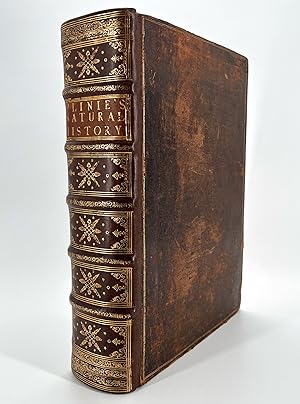About this Item
Folio, 11.75 x 8 inches (298 x 203 mm), 2 VOLUMES bound into one. Pp. (58), 614, (42); (12), 632, (84, 2). Title pages with woodcut devices present in both parts (lacking blanks [pi]1 and Ppp8), woodcut initials, head and tailpieces, copious indexes of both volumes, final errata sheet. Full later calf, rebacked, extra gilt spine with 5 raised bands, some rust spots, marginal tears and paper flaws, eight leaves with expertly repaired corners, with resulting small loss of text; occasional marginalia; paper supple and evenly toned; binding somewhat scuffed but firm and square. Armorial bookplate of James Backnell Praed pasted inside front cover. [Carter 5; Pforzheimer 496; ESTC 006187259]. A handsome and rare copy of the first full English translation of Pliny's Naturalis Historia, by Philemon Holland, the greatest translator of the Elizabethan age. «The Natural History of Pliny the Elder is more than a natural history: it is an encyclopaedia of all the knowledge of the ancient world. The famous story of Pliny s death while trying to observe the eruption of Vesuvius at closer quarters than was prudent is often, and justly, cited as an example of the devoted curiosity on which the furthering of knowledge depends, and to the Romans his writing on the natural sciences was pioneer work (held in small esteem, as he modestly says, by his countrymen). He was a compiler rather than an original thinker, and the importance of this book depends more on his exhaustive reading (he quotes over four hundred authorities, Greek and Latin) than on his original work. All the spare time allowed him by a busy administrative career was devoted to reading ; he began long before daybreak, his nephew the younger Pliny recorded, and grudged every minute not spent in study; no book was so bad, he used to say, as not to contain something of value. When he died the Natural History (the sole extant work out of one hundred and two volumes from his pen) was still incomplete. It comprises thirty-seven books dealing with mathematics and physics, geography and astronomy, medicine and zoology, anthropology and physiology, philosophy and history, agriculture and mineralogy, arts and letters. He is scrupulous in his acknowledgement of his sources (you must, he wrote, with honest humility, declare those from whom you have profited), and the whole of the first book is devoted to the tables of con tents and authorities which bear witness to his method. The Historia soon became a standard book of reference. One of the earliest books to be printed at Venice, the centre from which so much of classical literature was first dispensed, it was later translated into English by Philemon Holland in 1601, and twice reprinted (a notable achievement for so vast a text).» [Carter, John. Printing and the Mind of Man. New York: Holt, Rinehart & Winston, 1967]. Seller Inventory # 84
Contact seller
Report this item
![]()




